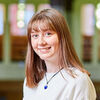
Rebecca Illidge
- Course: BA History
- Graduation: 2020
- Nationality: British
- Location of year abroad: United States
Please tell us a bit about yourself.
Away from Leeds, I live in a small town in the West Midlands near Birmingham. Here, I work in a local museum focused on the mining period of the area.
Currently, I am in my second year at University studying BA History. I am really enjoying university and my course so far.
I am completing a study abroad year next year at North Carolina State University in the United States, which I am really excited about. In terms of geography, I find America to have some of the most interesting history, especially in terms of women and civil rights, and I am excited to learn more about it through their own lens.
What made you want to apply to your course and to Leeds?
I have always been interested in especially the social side of history; how particular historical events both helped shape and were shaped by individuals or groups. In particular, the history of the working class of women is most interesting to me. I find it unjust that up until recently, historical debate was not given due attention to these groups and they have been largely excluded from discussion. It is important for current historians to redefine history in their terms.
One of the biggest reasons I chose Leeds was because of the availability to study these modern and social discourses, and the researchers themselves seemed so enthusiastic. I had also never experienced the North and really wanted to.
What is it that makes you passionate about your area of study?
I am really interested in the experiences of people; how behaviour and actions shape history and how events influence the lives of ordinary individuals. I am especially interested in women and feminist history and not only how they have been excluded from many roles and opportunities in history itself, but also in the historiography of the period.
What aspects of the course do you enjoy the most?
It is really exciting to be reading the most up-to-date discussions on the periods which I am studying, and it is also great to be encouraged to think about these debates analytically; to not just agree with historians, but realise that we can critique and disagree with their arguments.
What would you say about the learning facilities in your School and at the University in general?
I think the School of History is not hugely equipped with learning facilities, but I believe this is mainly due to the nature of the course in that it is quite difficult to provide these. The university facilities I make the most use of are the libraries, and I have also taken advantage of the library workshops which are greatly helpful.
Have you taken part in any activities outside of your studies?
In first year, I was a member of the Swimming and Water Polo Team, continuing on from my participation in the sport before University. Currently, I am a member of the Feminist Society and attend weekly discussions. I also work in the Union Co-operative.
What would you say to anyone thinking of applying to your course?
Be aware of the amount of reading for weekly seminars and that most of your knowledge and understanding will come from this, as there is only one weekly lecture for each module and this tends to just be an overview of the topic. You therefore have to be proactive in your research.
Tell us about your accommodation and your experience of living in Leeds.
In first year, I lived on campus in Henry Price and I currently live in Hyde Park. Living in University Halls is a great way to make friends, and although I no longer live with my previous flatmates we still meet regularly. Hyde Park is a nice place to live for students as it is in close proximity to University, however, the main supermarkets are quite far.
What do you plan to do once you’ve finished your course?
I am still very unsure about my plans after University, but I am confident that my degree and wider university experience will equip me with transferrable skills for a whole host of career paths.

